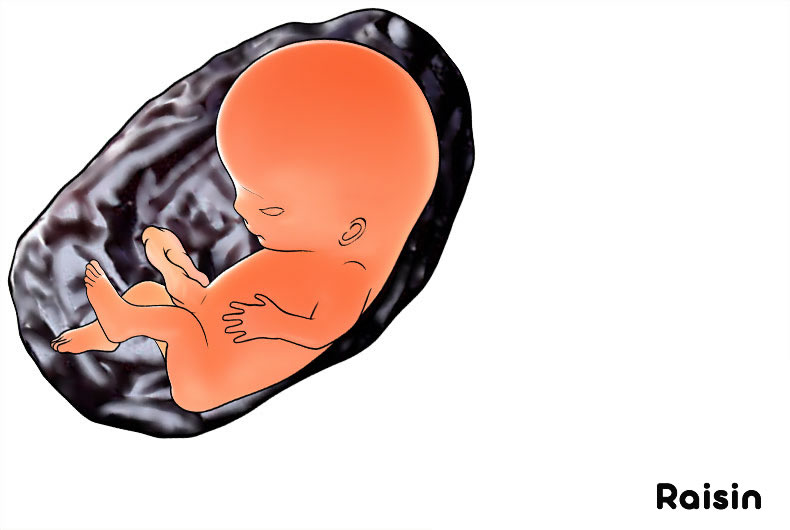10 weeks pregnant

Your pregnancy is entering the final stretch of the 1st trimester, or as many prefer to count, it is in the middle of the 3rd month. Indeed, the timing of pregnancy can be a bit confusing, but your baby’s formation is evolving more and more.
This week also marks the end of the embryonic period and your baby receives a promotion for the fetus, which means that the organs are all formed and in the coming weeks they will develop more and mature.
Your body will also give the first apparent signs of change, although barely visible to others. You will notice that some pants do not close as easily as before and the belly is more rounded.
Want to know a little more about what happens to your baby and you and what care you need to take during this week? So keep reading. Always remembering that the symptoms are unique for each woman and that some babies may grow more than others, so don’t compare and enjoy your pregnancy.
Baby development
The baby already begins to have the features that will remain until the end of the pregnancy, with few changes. Now, it is 2.8 to 3.1 cm and weighs about 5g, which can be compared to a very beautiful strawberry.
The eyelids cover the eyes, which migrate forward and the ears move to the correct position. The toes and hands are separated and the joints are ready, which only increases the movement inside your uterus, even if you cannot perceive it.
This week, the external genitals are in formation, with the clitoris for girls and the production of testosterone and the penis for boys. It is not yet possible to see by ultrasound, unless a fetal sex test is done, only performed by private clinics, without coverage by health plans.
The stomach secretes digestive juices and the baby swallows the amniotic fluid, which will stimulate the digestive and respiratory systems and reaches the intestines, is filtered and absorbed by the kidneys, returning in the form of urine, which will happen until the end of the pregnancy.
What happens to mom
Nausea, which occurs due to the increase in HCG and progesterone, should still continue until the end of the quarter, probably between the 12th and 13th weeks. Try to eat at shorter intervals and eat citrus fruits. If they are too intense, talk to your doctor about prescribing a medication to relieve your symptoms.
The blood flow will increase by up to 50%, from 4.5 to 6.7 liters. This is your body working bent to shelter the baby, so the heart beats faster and is what explains the excessive tiredness. Veins can
The uterus is larger, being compared to a papaya or a small avocado. Which is one of the main reasons for going to the bathroom to be more constant to urinate. Back pain should also occur for the same reason.
Excessive saliva, clinically called sialorrhea is another symptom that will bother you. The reason is due to nausea and vomiting, which make the woman swallow less, the good part is that they decrease along with the other initial symptoms, as the pregnancy progresses.
But not everything is bad in pregnancy. After the initial phase, your libido will improve and you can have a relatively normal sex life.
Care that should be taken at this stage
It is necessary to pay attention to a balanced diet. Greater weight loss can pose problems in the baby’s development, as well as health risks. Likewise, an increase in weight above the recommended can bring problems such as pre-eclampsia and gestational diabetes.
Fruits and vegetables are very welcome throughout pregnancy. Avoid very fatty foods. Try to drink natural juices, without adding sugar or sweeteners and reduce your caffeine consumption to a maximum of two cups of coffee a day. Preferably avoid.
Lighter exercises like walking help in the ideal weight gain, as well as contribute to a better blood circulation, reduce the swelling of the legs and the incidence of veins. They strengthen muscles, improve balance and are recommended for not overloading the joints.
The use of body moisturizers and sunscreens prevents stretch marks and the appearance of spots. Other beauty products may contain chemicals that are harmful to the baby and you, who are more sensitive to certain components, so don’t use it.
Weight gain in pregnancy
Weight gain during pregnancy is normally expected. There is a division about weight distribution, being divided between the weight of the uterus, the placenta, umbilical cord, changes in the breasts, amniotic fluid, and of course, the baby’s weight.
However, excessive weight, as well as less weight gain, can be harmful to the baby’s development and the mother’s health, so it is important to try to put on weight as recommended by your doctor.
The orientation is that the woman gains between 5 to 18 kg during pregnancy, meaning an average of 2 kg in the first trimester and about 0.5 kg per week until the last week.
This weight gain is also related to the woman’s body mass index (BMI). Women with an initial BMI of 18.5 are recommended to gain between 13 kg to 18 kg, since those who start pregnancy overweight, with a BMI greater than 30, have an ideal weight gain between 5 kg to 9 kg.
For better guidance on nutrition, speak to your doctor and consult a nutritionist.
